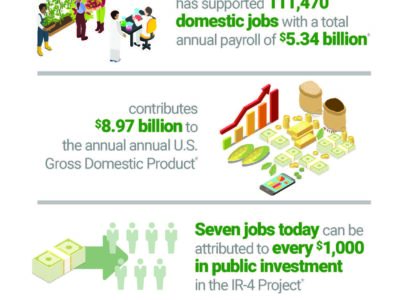The IR-4 Project is known within the specialty crop agriculture community to be a highly productive government funded research project that has delivered many registrations of necessary crop protection products to growers. Headquartered out of North Carolina State University, the IR-4 Project conducts research to develop data needed for registrations with an annual funding of approximately $17 million. To understand the economic impact of the actions and deliverables of the IR-4 Project, Michigan State University’s Center for Economic Analysis was commissioned to assess the economic contributions of the IR- 4 Project.
is known within the specialty crop agriculture community to be a highly productive government funded research project that has delivered many registrations of necessary crop protection products to growers. Headquartered out of North Carolina State University, the IR-4 Project conducts research to develop data needed for registrations with an annual funding of approximately $17 million. To understand the economic impact of the actions and deliverables of the IR-4 Project, Michigan State University’s Center for Economic Analysis was commissioned to assess the economic contributions of the IR- 4 Project.
The IR-4 Project (IR-4) contributes great value in terms of contributions to the annual gross domestic product and job support. In March 2022, Dr. Steven Miller and Dr. John Mann reported that IR-4’s efforts support 111,470 domestic jobs with a total annual payroll of $5.34 billion in 2021 dollars, while contributing $8.97 billion to the annual gross domestic product.
Specialty crops are fruits, vegetables, nuts, herbs and non-food ornamental crops. Collectively they are valued at nearly $65 billion annually and are about one-third of domestic crop sales. Protecting specialty crops from destructive insects, plant diseases, weeds and other pests is critically important to ensure the public has access to quality food as well as ornamental plants that enhance the environment. US Congress established the IR-4 Project to ensure that growers of specialty crops have legal access to safe and effective pest management technologies to protect them. It is necessary because the private sector focuses their research and development resources on major crops such as corn, cotton and soybean that provide adequate return on investments. IR-4 has been successful, supporting over 23,000 registrations on food crops and over 30,000 regulatory use recommendations on ornamental crops over the past 60 years.
IR-4 Project Executive Director, Dr. Jerry Baron noted, “The need for the IR-4 Project continues to increase due to multiple factors. Until 2021, IR-4 federal appropriations remained flat for 12 years. During that time, the IR-4 was forced to decrease our support for specialty crop protection from pests. While IR-4 received a small funding increase in 2021, this increase does not offset the loss of spending power. The ability of our team to continue to positively impact the economy, despite our decreasing budget, illustrates our commitment to ensuring specialty crop growers have the tools they need to produce safe and healthy food for our nation.”
Food Crop Program
About 60 percent of product registrations by the U.S. Environmental Protection Agency for use on specialty food crops were made possible with research through the IR-4 Food Crop Program.
The analysis found that IR-4’s Food Crop Program has had the following economic impacts:
- 75,300 total jobs supported (directly and indirectly)
- $3.59 billion in annual labor income
- $6 billion contributed to the annual Gross Domestic Product (GDP)
- $4.31 billion increase in specialty food crop sales
Environmental Horticulture Program
The IR-4 Project also works with the ornamental crop industry through its Environmental Horticulture Program to develop data and information used to protect floriculture and nursery crops from pests.
The analysis found that this program has had the following economic impacts:
- 9,700 total jobs supported (directly and indirectly)
- $456 million in annual labor income
- $725.5 million contributed to the annual GDP
- Annual crop losses mitigated valued at $506 million
Biopesticide Regulatory Support
IR-4’s Biopesticide Regulatory Support Program provides regulatory assistance to public sector scientists and small businesses navigating the EPA registration process for biopesticides. Eighty percent of biopesticides on the market are used by fruit and vegetable crop growers.
The analysis found that this program has had the following economic impacts:
- 25,700 total jobs supported (directly and indirectly)
- $1.25 billion annual income
- $2.14 billion contributed to the annual GDP
- $1.58 billion net contribution to organic crop production through productivity enhancements and crop damage avoidance
Section 18 Emergency Exemptions
The IR-4 Project is also an active participant in the approval of Section 18 Emergency Exemptions. These exemptions are requested of the U.S. EPA by federal and state agencies for the expedited approval of a new use of an existing crop protection technology in an emergency situation.
Collectively with other partner agencies, the analysis found that IR-4’s support of Section 18 Emergency Exemptions have had the following economic impacts:
- 510 jobs retained annually (directly and indirectly)
- $25 million annual income
- $42.9 million contributed to the annual GDP
- $29.7 million in crop loss aversion per year
To read the full report, executive summary, one pager and access the infographic, visit our outreach webpage.
About the IR-4 Project
The mission of the IR-4 Project is to facilitate regulatory approval of sustainable pest management technologies for specialty crops and specialty uses to promote public well-being. By working directly with local crop growers across the country, IR-4 conducts research and develops data necessary for the registration of pest management tools, ensuring that they are safe for use. To learn more, visit our website.
